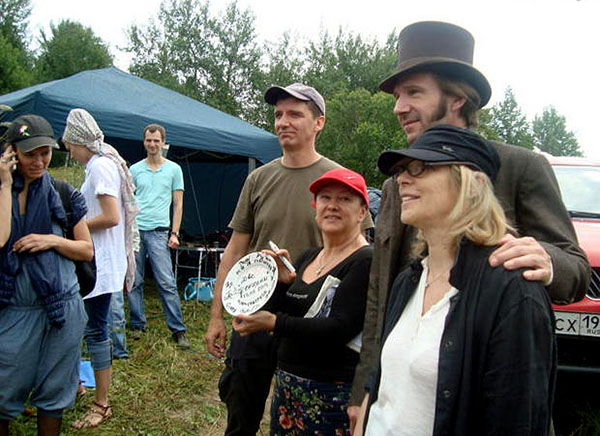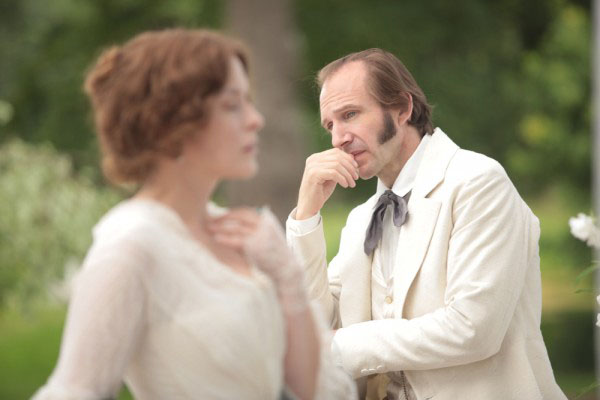
Vera Glagoleva: Turgenev’s Language Is Endlessly Beautiful
/ Главная / Russkiy Mir Foundation / Publications / Vera Glagoleva: Turgenev’s Language Is Endlessly BeautifulVera Glagoleva: Turgenev’s Language Is Endlessly Beautiful
Vera Glagoleva, one of the most popular actresses of the late Soviet period, has not starred in a film for the past five years. However, the People’s Artiste of Russia will soon be presenting her new film. Glagoleva’s film was one of 20 selected by the Ministry of Culture for financial support. The selection of this film, called “Two Women”, was no coincidence, as it is based on Ivan Turgenev’s play “A Month in the Country.” The fact that Ralph Fiennes plays the leading role is enough to make this a highly anticipated picture. It has been particularly popular lately to make films based on Russian classics; however, not so many of them have been big successes. Glagoleva says that she turned to Turgenev because “Turgenev’s language is endlessly beautiful.”

— Why did you choose “A Month in the Country”?
— Out of a desire to show the audience in addition to the omnipresent action film format a story can be old in beautiful way, with a beautiful language. Turgenev’s language is endlessly beautiful. That’s how the play is written! The heroes experience such feelings! The most interesting thing for any actor and director is figuring out what needs to be acted out, rehearsals, and Turgenev provides enormous opportunities: delving into his work, you can open new horizons. So that is why I chose Turgenev, “A Month in Country”, and probably also playing a role here was Anatoly Efros’s production in 1977 (at the Malaya Bronnaya Theater in Moscow – ed.). That production was a major event in the theatrical world. In part because there had not yet been any film version of this work. But there were many stage productions. Strangely enough, most were in Europe, as Ivan Turgenev himself was a man of Europe. In France, England and Germany his works are always being performed. The role of Natalya Petrovna is an event of biographical importance for every actress.
— Were foreign actors brought into the film as a nod to the cosmopolitanism of the writer?
— Yes, the German tutor is played by a German (Bernd Moss – ed.), as in the 19th century it was customary to hire tutors from Europe. Natalya’s companion is a Frenchwoman. Actress Sylvie Testud beautifully reads Voltaire in French. It is quit logical. Rakitin is played by the British actor Ralph Fiennes, because in terms of his internal world, chivalry and attitude toward life his is absolutely a man of the 19th century, and this choice was now coincidence. It seemed to me that Rakitin was just this type of person.
— Today it is popular to change the text of the author. How did you approach the original text?
— We worked on the text. In 1909 Stanislavsky, when he was putting on this play, ruthlessly cut it down and believed that he was right to do so. We took some of the theatrics out of the text. In the play there are a lot of internal monologues which are spoken from the stage in order to show the audience the hero’s feelings. But this is not necessary for film.
— In our television series based on great literature, such as Sergey Soloviev’s “Anna Karenina”, one can see fake vases and other artificiality. You shot the picture using real film. Were you focused on accurately portraying the spirit of the time?

— It would be unethical to comment on Soloviev. There are quality television series, such as Vladimir Khtinenko’s “Dostoevsky”. But by and large everything seems rather templated. We really strived to transmit the spirit of the time and selected Glinka’s estate as the location. It is very pretty there. The museum management and department of culture of the Smolensk region were very accommodating and we received a lot of help.
— How do you feel about the most recent films made based on Russian classics? Take for example Joe Wright’s “Anna Karenina” with Keira Knightley in the lead role.
— If we watched this film and it wasn’t called Anna Karenina and did not have any connection to the great novel, then I would say that it is a wonderful, interesting film with a large number of novelties from the director. It is a good entertaining film, surprising film. Everything is beautiful and shallow. You don’t worry about the heroine, you don’t pity anyone.
— Should classical literature not be made more modern?
— Why not, if you do it as talentedly as Baz Luhrmann’s “Romeo + Juliet” with DiCaprio playing the main role. It is grandiose and amazing because it is a modern story and young people and for young people. Another example is Ralph Fiennes’ “Coriolanus”. This is also Shakespeare but in a modern presentation. There are relatively few successes – when classical literature placed in the present – because there is an obvious difference between what the heroes experienced then and now.
— Are you completely occupied with your film or do you already have plans for the future?
— I am not even thinking about it. Right now the most important thing is to complete it. The editing and sound. The post production will be rather complicated. As far as further plans are concerned, I would again like to take a look at the classics. Chekhov is fathomless. We’ll see.
— Does out film industry make enough use of the classics?
— Not often enough because few are interested in this. When we approached television channels about our project they declined. They said that classics aren’t needed. That seems indecent, don’t you think? We hope that with the release of “Two Women” something might change. The Ministry of Culture and Cinema Fund were accommodating, allocated money and had faith that there is a place in modern cinematography for the classics.
Anna Pozina, Oleg Karmunin
Izvestiya
| Tweet |
New publications

 Mikhail Kalatozov, a director who transformed the world of cinematography in many ways, was born 120 years ago. He was a Soviet film official and a propagandist. Above all, he was capable of producing movies that struck viewers with their power and poetic language.
Mikhail Kalatozov, a director who transformed the world of cinematography in many ways, was born 120 years ago. He was a Soviet film official and a propagandist. Above all, he was capable of producing movies that struck viewers with their power and poetic language.  Ukrainian authorities have launched a persecution campaign against the canonical Ukrainian Orthodox Church (UOC), the biggest one in the country's modern history. Over the past year, state sanctions were imposed on clergy representatives, searches were conducted in churches, clergymen were arrested, criminal cases were initiated, the activity of the UOC was banned in various regions of the country, and monasteries and churches were seized.
Ukrainian authorities have launched a persecution campaign against the canonical Ukrainian Orthodox Church (UOC), the biggest one in the country's modern history. Over the past year, state sanctions were imposed on clergy representatives, searches were conducted in churches, clergymen were arrested, criminal cases were initiated, the activity of the UOC was banned in various regions of the country, and monasteries and churches were seized.  When Nektary Kotlyaroff, a fourth-generation Russian Australian and founder of the Russian Orthodox Choir in Sydney, first visited Russia, the first person he spoke to was a cab driver at the airport. Having heard that Nektariy's ancestors left Russia more than 100 years ago, the driver was astonished, "How come you haven't forgotten the Russian language?" Nektary Kotlyaroff repeated his answer in an interview with the Russkiy Mir. His affinity to the Orthodox Church (many of his ancestors and relatives were priests) and the traditions of a large Russian family brought from Russia helped him to preserve the Russian language.
When Nektary Kotlyaroff, a fourth-generation Russian Australian and founder of the Russian Orthodox Choir in Sydney, first visited Russia, the first person he spoke to was a cab driver at the airport. Having heard that Nektariy's ancestors left Russia more than 100 years ago, the driver was astonished, "How come you haven't forgotten the Russian language?" Nektary Kotlyaroff repeated his answer in an interview with the Russkiy Mir. His affinity to the Orthodox Church (many of his ancestors and relatives were priests) and the traditions of a large Russian family brought from Russia helped him to preserve the Russian language.

 The leaders of the Friends of the Great Russia cultural association (Amici Della Grande Russia) in Italy believe that the Western policy of abolishing Russian culture in Europe has finally failed. Furthermore, it was doomed to failure from the beginning.
The leaders of the Friends of the Great Russia cultural association (Amici Della Grande Russia) in Italy believe that the Western policy of abolishing Russian culture in Europe has finally failed. Furthermore, it was doomed to failure from the beginning.  Name of Vladimir Nemirovich-Danchenko is inscribed in the history of Russian theater along with Konstantin Stanislavski, the other founding father of the Moscow Art Theater. Nevertheless, Mr. Nemirovich-Danchenko was a renowned writer, playwright, and theater teacher even before their famous meeting in the Slavic Bazaar restaurant. Furthermore, it was Mr. Nemirovich-Danchenko who came up with the idea of establishing a new "people's" theater believing that the theater could become a "department of public education."
Name of Vladimir Nemirovich-Danchenko is inscribed in the history of Russian theater along with Konstantin Stanislavski, the other founding father of the Moscow Art Theater. Nevertheless, Mr. Nemirovich-Danchenko was a renowned writer, playwright, and theater teacher even before their famous meeting in the Slavic Bazaar restaurant. Furthermore, it was Mr. Nemirovich-Danchenko who came up with the idea of establishing a new "people's" theater believing that the theater could become a "department of public education."  "Russia is a thing of which the intellect cannot conceive..." by Fyodor Tyutchev are famous among Russians at least. December marks the 220th anniversary of the poet's birth. Yet, he never considered poetry to be his life's mission and was preoccupied with matters of a global scale. Mr.Tyutchev fought his war focusing on relations between Russia and the West, the origins of mutual misunderstanding, and the origins of Russophobia. When you read his works today, it feels as though he saw things coming in a crystal ball...
"Russia is a thing of which the intellect cannot conceive..." by Fyodor Tyutchev are famous among Russians at least. December marks the 220th anniversary of the poet's birth. Yet, he never considered poetry to be his life's mission and was preoccupied with matters of a global scale. Mr.Tyutchev fought his war focusing on relations between Russia and the West, the origins of mutual misunderstanding, and the origins of Russophobia. When you read his works today, it feels as though he saw things coming in a crystal ball...